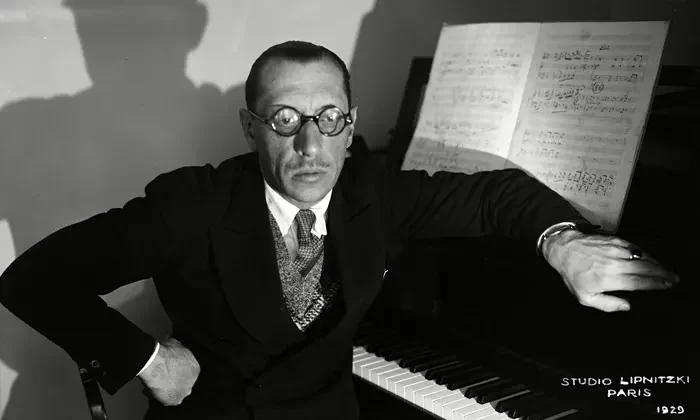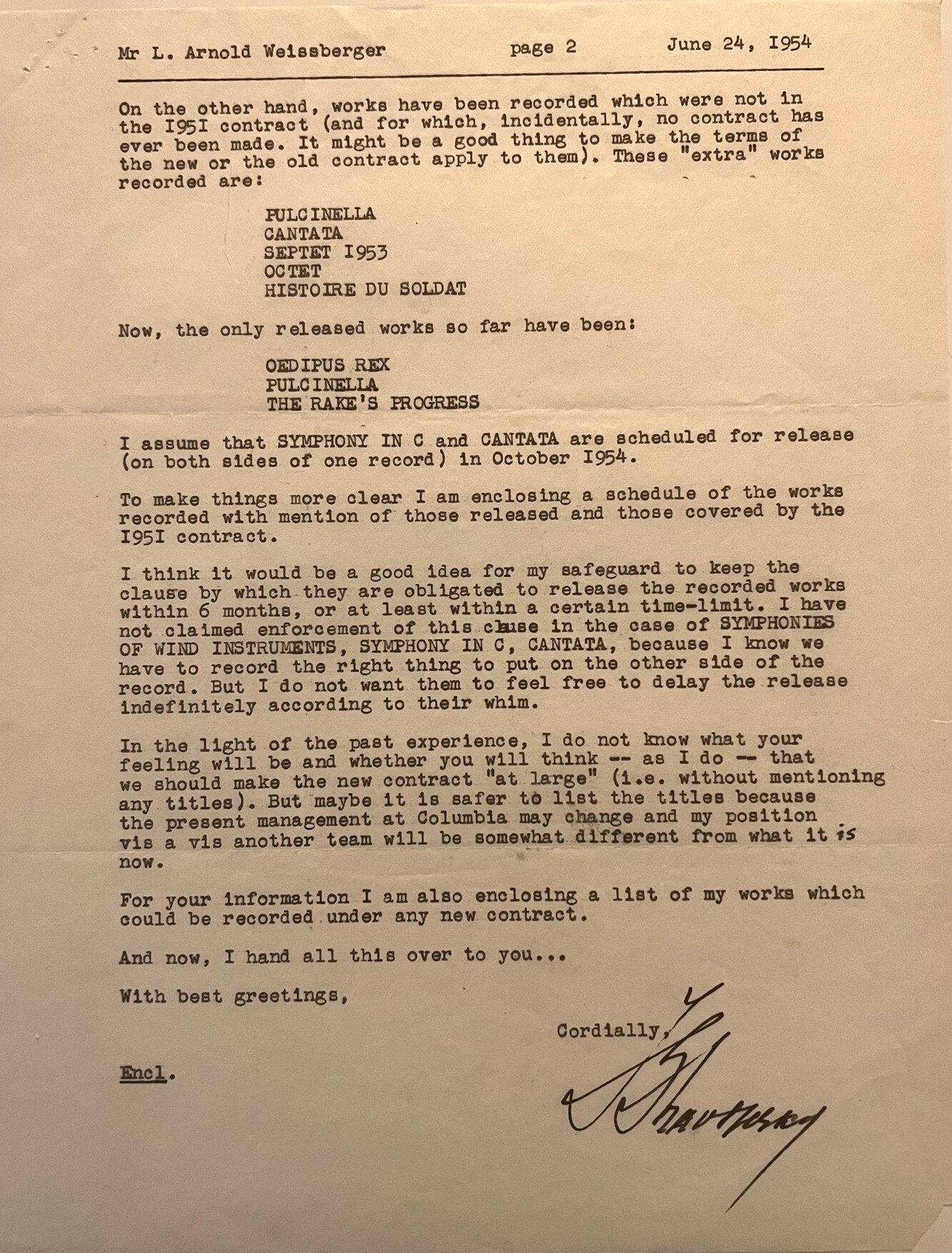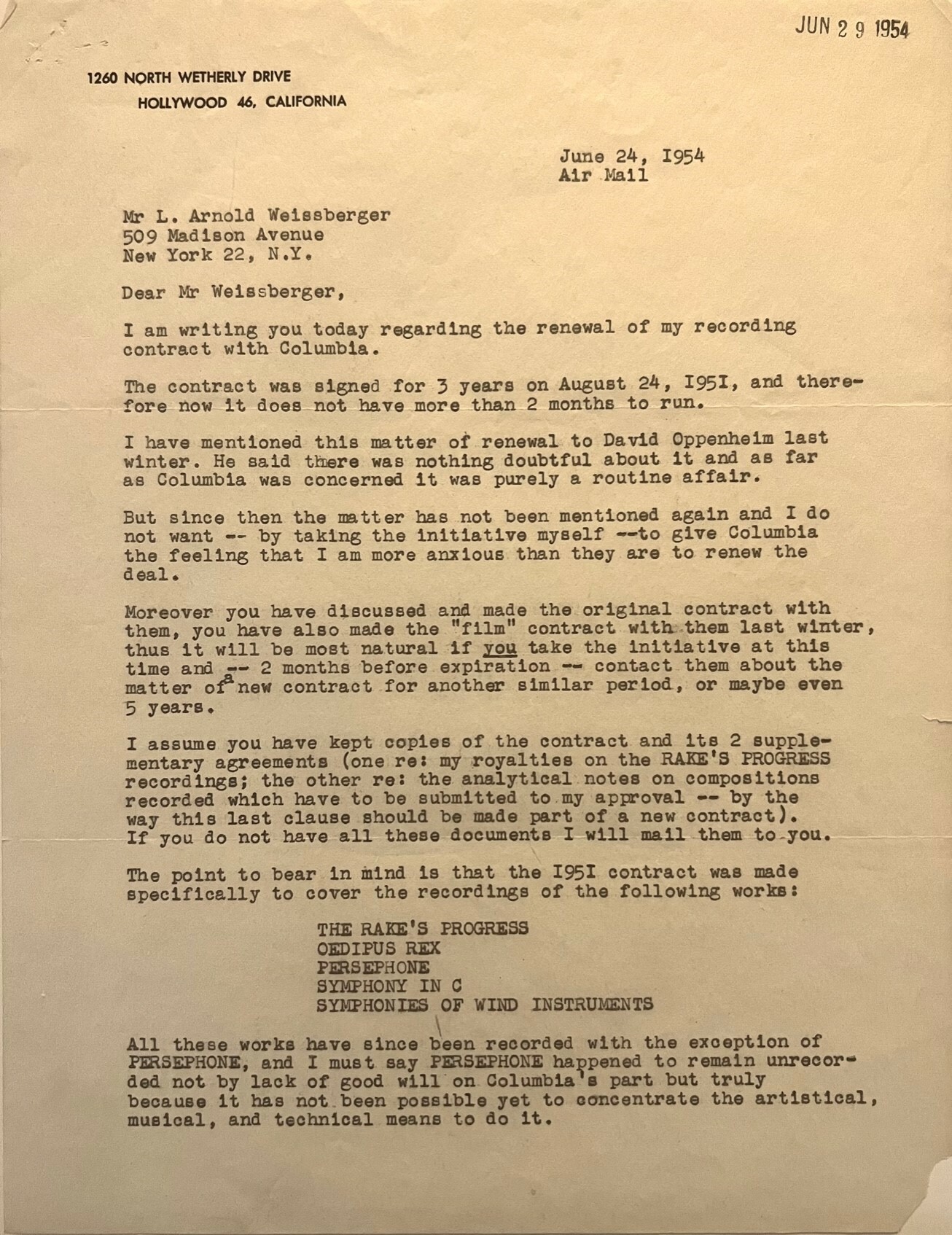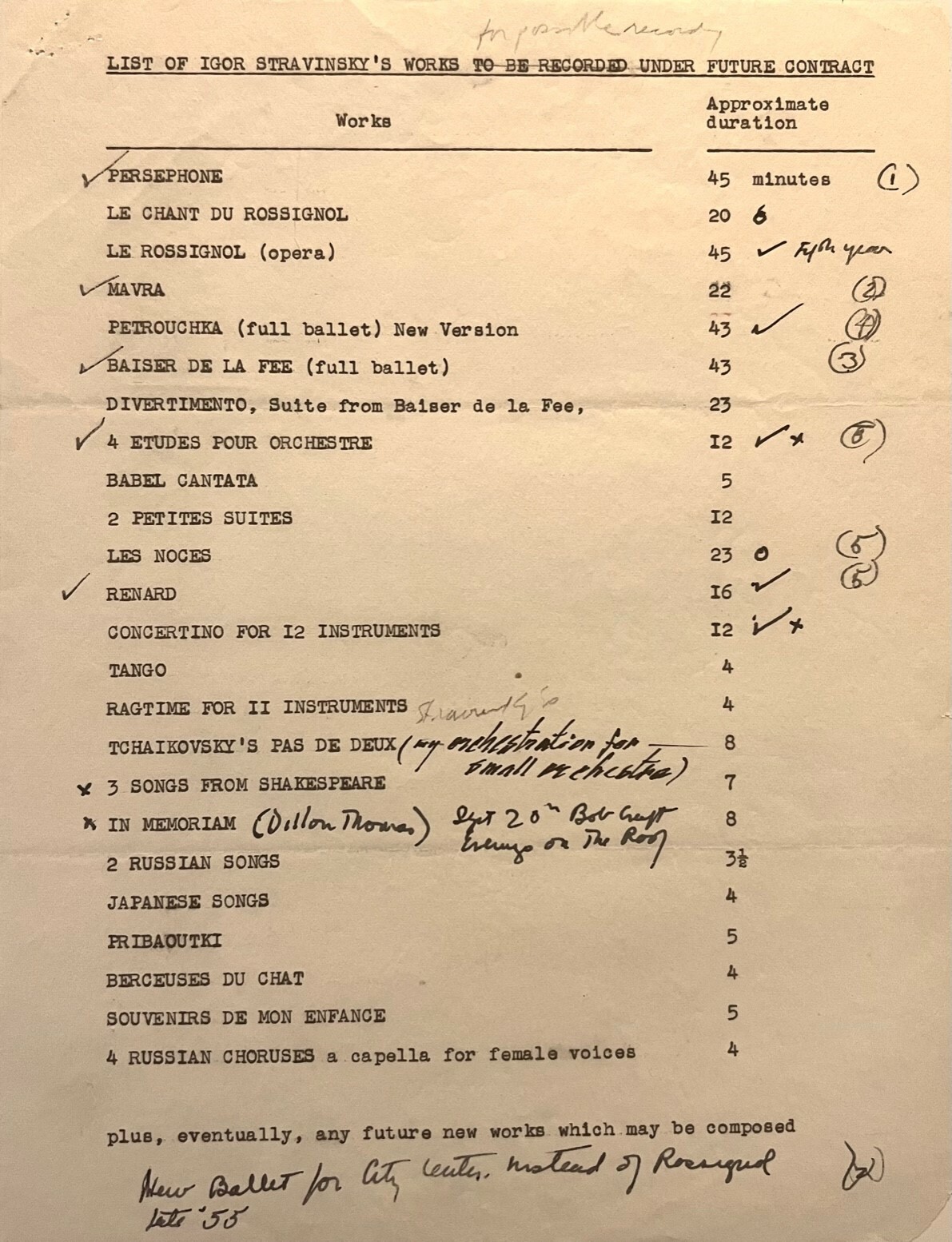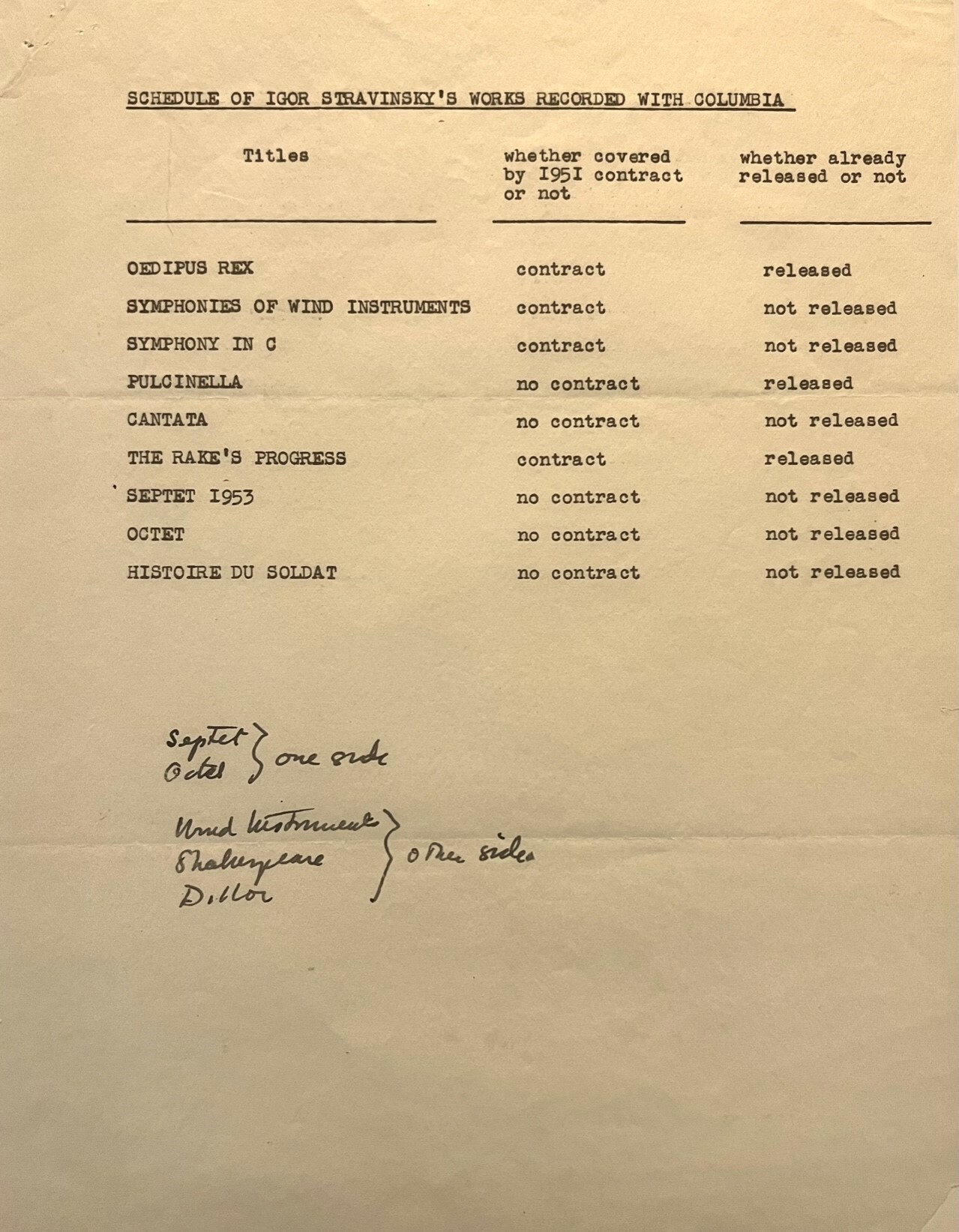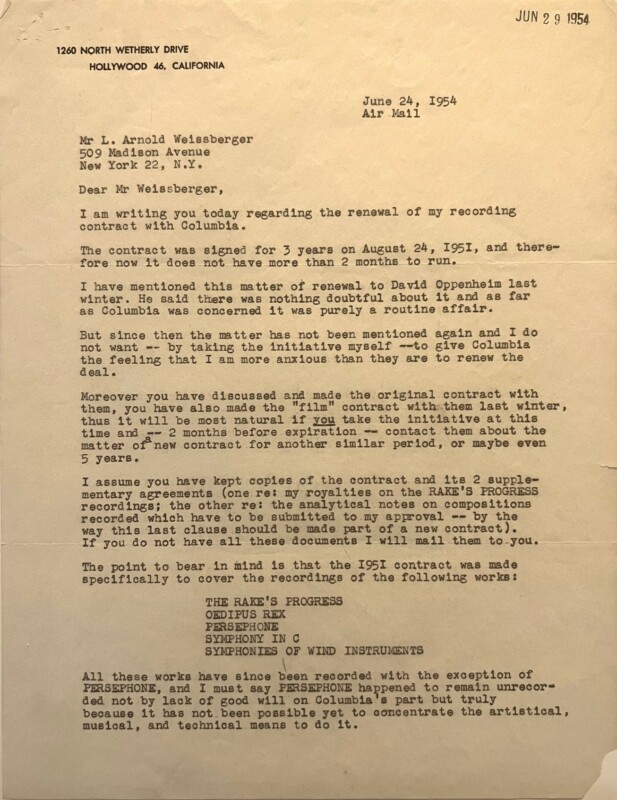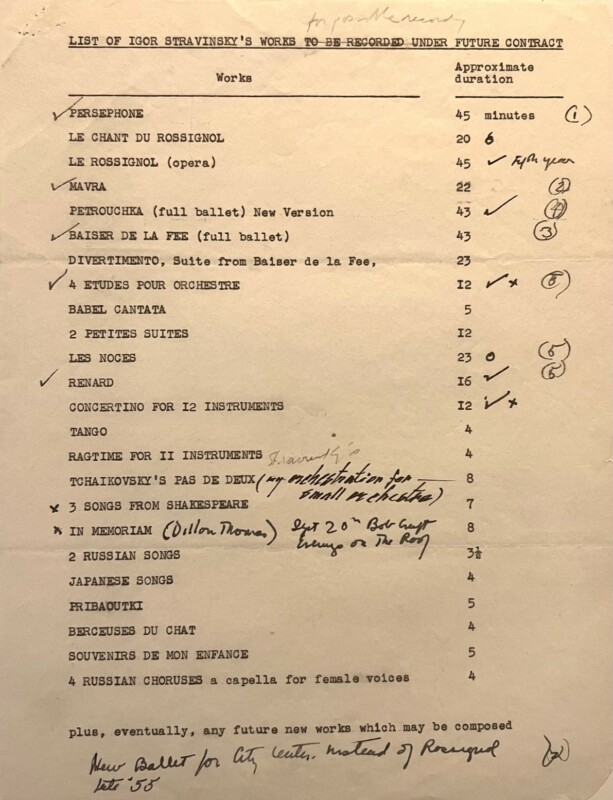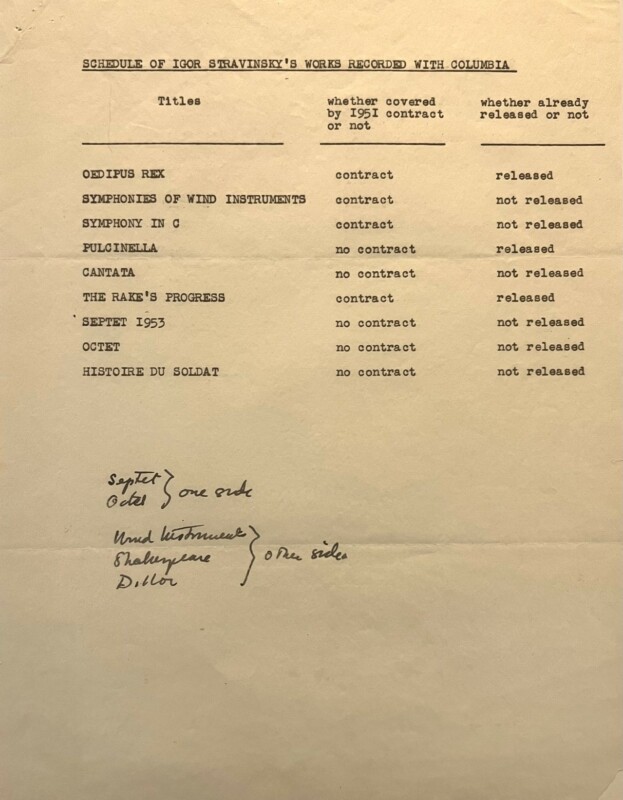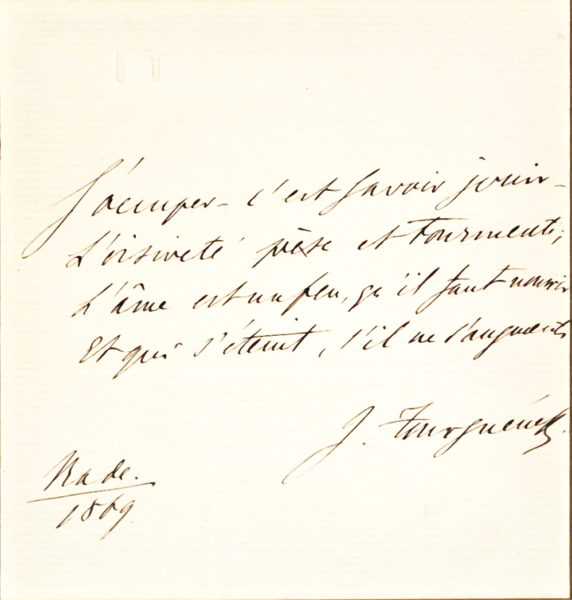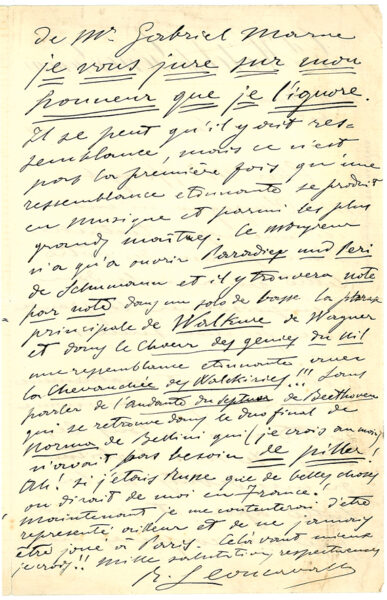THE RAKE’S PROGRESS
OEDIPUS REX
PERSEPHONE
SYMPHONY IN C
SYMPHONIES OF WIND INSTRUMENTS
All these works have since been recorded with the exception of PERSEPHONE, and I must say PERSEPHONE happened to remain unrecorded not by lack of good will on Columbia’s part but truly because it has not been possible yet to concentrate the artistical [sic.], musical, and technical means to do it. On the other hand, works have been recorded which were not in the 1951 contract (and for which, incidentally, no contract has ever been made. It might be a good thing to make the terms of the new or the old contract apply to them). These “extra” works recorded are:
PULCINELLA
CANTATA
SEPTET 1953
OCTET
HISTOIRE DU SOLDAT
Now, the only released works so far have been:
OEDIPUS REX
PULCINELLA
THE RAKE’S PROGRESS
I assume that SYMPHONY IN C and CANTATA are scheduled for release (on both sides of one record) in October 1954. To make things more clear I am enclosing a schedule of the works recorded with mention of those released and those covered by the 1951 contract. I think it would be a good idea for my safeguard to keep the clause by which they are obligated to release the recorded works within 6 months, or at least within a certain time-limit. I have not claimed enforcement of this clause in the case of SYMPHONIES OF WIND INSTRUMENTS, SYMPHONY IN C, CANTATA, because I know we have to record the right thing to put on the other side of the record. But I do not want them to feel free to delay the release indefinitely according to their whim. In the light of the past experience, I do not know what your feeling will be and whether you will think – as I do – that we should make the new contract “at large” (i.e. without mentioning any titles). But maybe it is safer to list the tiles because the present management at Columbia may change and my position vis a vis another team will be somewhat different from what it is now. For your information I am also enclosing a list of my works which could be recorded under any new contract. And now, I hand all this over to you…. With best greetings, Cordially…”
[There follows a two-page typed with a five-word addendum in Stravinsky’s hand:]
LIST OF IGOR STRAVINSKY’S WORKS TO BE RECORDED UNDER FUTURE CONTRACT
Works Approximate duration
PERSEPHONE 45 minutes
LE CHANT DU ROSSIGNOL 20
LE ROSSIGNOL (opera) 45
MAVRA 22
PETROUCHKA (full ballet) New Version 43
BAISER DE LA FEE (full ballet) 43
DIVERTIMENTO, Suite from Baiser de la Fee, 23
4 ETUDES POUR ORCHESTRE 12
BABEL CANTATA 5
2 PETITES SUITES 12
LES NOCES 23
RENARD 16
CONCERTINO FOR 12 INSTRUMENTS 12
TANGO 4
RAGTIME FOR 11 INSTRUMENTS 4
TCHAIKOVSKY’S PAS DE DEUX (My orchestration for small orchestra) 8
3 SONGS FROM SHAKESPEARE 7
IN MEMORIAM (Dillon Thomas)Sept 20th Bob Craft Evenings on the Roof 8
2 RUSSIAN SONGS 3½
JAPANESE SONGS 4
PRIBAOUTKI 5
BERCEUSES DU CHAT 4
SOUVENIRS DE MON ENFANCE 5
4 RUSSIAN CHORUSES a capella for female voices 4
Plus, eventually, any future new works which may be composed. New Ballet for City Center, instead of Rosignol late ’55.
SCHEDULE OF IGOR STRAVINSKY’S WORKS RECORDED WITH COLUMBIA
Titles whether covered by 1951 contract or not whether already released or not
OEDIPUS REX contract released
SYMPHONIES OF WIND INSTRUMENTS contract not released
SYMPHONIES IN C contract not released
PULCINELLA no contract released
CANTATA no contract not released
THE RAKE’S PROGRESS contract released
SEPTET 1953 no contract not released
OCTET no contract not released
HISTOIRE DU SOLDAT no contract not released
Septet} One side
Octet}
Wind Instruments} Other side
Shakespeare}
Dillon}”
In 1939, after living in Switzerland and France, Stravinsky moved to the United States. “Once he had settled in Hollywood Stravinsky was inevitably approached with suggestions that he should write music for films [including a few Columbia Pictures films]. Some of these projects were so fatuous they were dismissed at once; but others engaged his interest, and in a few cases he had begun to compose music before they were abandoned. Fortunately he was able to salvage a considerable part of this abortive film music and use it again in such works as Four Norwegian Moods (1942), the Ode (1943), the Scherzo à la russe (1944) and the Symphony in Three Movements (1942-5),” (The New Grove Dictionary).
During the 1950s, Stravinsky toured internationally as a conductor of his own works and signed a contract with Columbia Records to conduct and record all his compositions. Among these was Pulcinella, the ballet based on musical fragments from Pergolesi, whose completion in 1920 marked “a major turning‑point in both the life and the art of Stravinsky,” (Stravinsky, Boucourechliev). As he himself would later recall, “‘Pulcinella was my discovery of the past, the epiphany through which the whole of my late work became possible. It was a backward look, of course… but it was a look in the mirror, too,’” (ibid.). Our detailed letter lists Pulcinella as well as Stravinsky’s many other compositions.
Docketed with a date stamp in the upper right corner of the first page. Several staple holes in the upper left corner. Folded and in fine condition.
